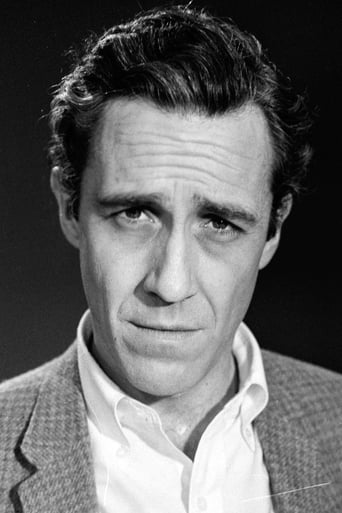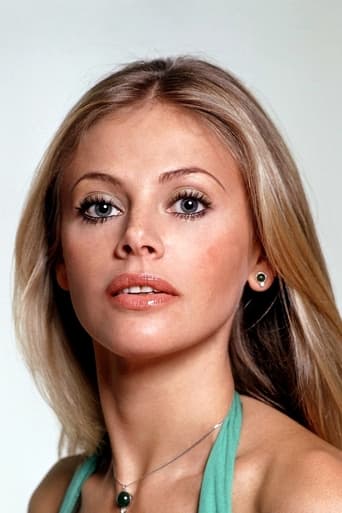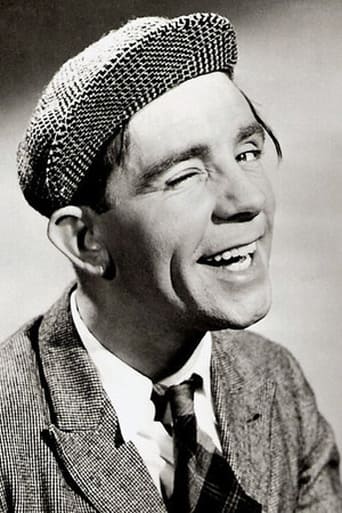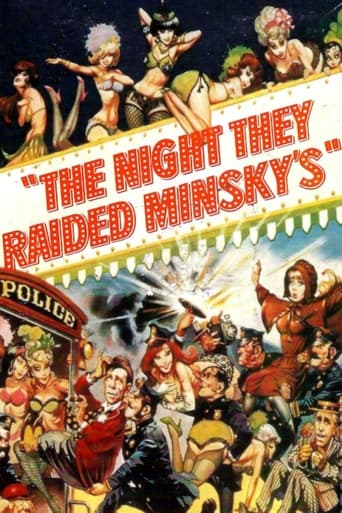
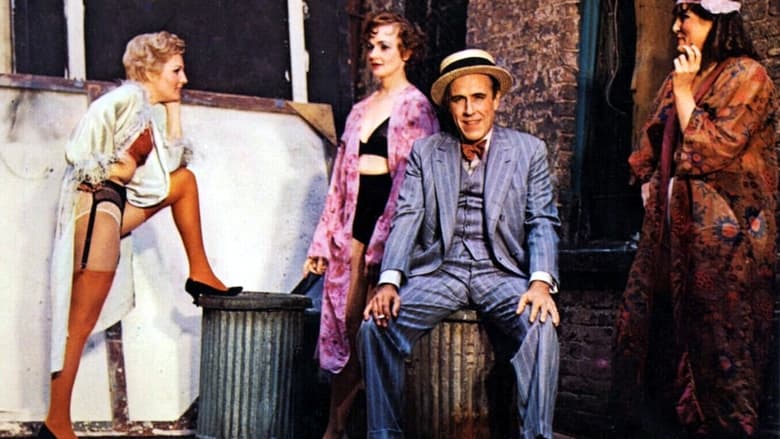
The Night They Raided Minsky's (1968)
Rachel arrives in New York from her Amish community intent on becoming a dancer. Unfortunately Billy Minsky's Burlesque is hardly the place for her Dances From The Bible. But the show's comedian Raymond sees a way of wrong-footing the local do-gooders by announcing the new Paris sensation "Mme Fifi" and putting on Rachel's performance as the place is raided. All too complicated, the more so since her father is scouring the town for her and both Raymond and his straight-man Chick are falling for Rachel.
Watch Trailer
Cast


Reviews
Released in 1968 this flick could have been made today as a relevant retrospective to burlesque.The naughty nature of burlesque versus the rude routines that pass as suggestive stage entertainment today are in stark contrast when you compare today's crude crotch cranking with the clumsy bumps and grinds of yesteryear.Produced by Norman Lear and directed by William Friedkin, it is based on a book by Rowland Barber which paints a fictional account of the invention of the striptease.This story opens in 1925 when a young Amish girl, Rachel (a very young Britt Ekland) arrives in New York City with misguided dreams of being a dancer.Of course her strict, overly religious father would have nothing to do with her dancing aspirations so she runs away from her home in Pennsylvania. For some strange reason she runs off to join the Minsky Burlesque show, obviously lacking a dictionary at home with which to look up the word "burlesque".Watching the scene of her entering the burlesque theater, I couldn't help but hum The Eagles "Those Shoes" over the resident soundtrack.When she arrives, she initially meets Professor Spats (a very old Bert "The Cowardly Lion" Lahr), a retired stage performer. Try making that long walk through New York City today without meeting characters a lot shadier than this nice old man. He was certainly a lot less menacing than the Cowardly Lion was to Dorothy.Wearing her naiveté on her homemade dress like a wino's spittle from a subway ride, the kindly Professor agrees to introduce her to the cast. All this in spite of her desire to perform dances from the Bible on stage. Really? Meanwhile, the theater owner Louis Minsky (Joseph "Dr. No" Wiseman) and his son, Billy (a very young Elliot Gould) are being hounded by a man named Fowler (Denholm Elliot), the Secretary for the Society for Decency, obviously a defunct office in these modern times. Believe it or not, he actually thinks the costumes are too skimpy, the humor too suggestive and the dancing a little too dirty. This guy would die of heart failure and a terminal erection just watching a Super Bowl halftime show these days, but I digress. Receiving letters from the Secretary of Decency, Billy's dad, Louis, wisely refuses to renew his son's lease. But he will sell the theater to him for a tidy sum. Billy tries to get Trim, a small time gangster and burlesque lover, to invest (a same-o-same-o looking Forrest Tucker) but he refuses. He's just there to enjoy the scenery.Cue classic funny man Chick Williams (Sir Norman Wisdom in an excellent vaudeville performance) and his "straight man" partner Raymond Paine (Jason Robards as a cad first class). When the Professor introduces the young runaway to the both of them, hilarity ensues, of course, but not before the foreshadowing of conflict. For Chick, it's love at first sight, whereas Raymond is less than impressed with all this Bible stuff. But, Britt IS hot, so will he just momentarily convert for a piece of the action? Not a chance.Read more here: http://glossynews.com/entertainment
An affectionate look at early burlesque, "The Night They Raided Minsky's" is at once nostalgic and funny. Grainy black-and-white footage of street life on New York's Lower East Side fades into color; a dapper Bert Lahr, an authentic vaudevillian from the period, strides past pushcarts laden with produce; a chorus line of over-painted, over-ripe ladies kick their legs in unison to the applause of a motley male audience. The atmosphere reeks of authenticity and the producer's love of the subject. The script by Arnold Shulman and Norman Lear revolves around a scheme to embarrass the local morals guardian into raiding the performance of a mythical Madame Fifi, who reputedly drove a million Frenchmen wild. When Madame Fifi appears, she would be an innocent Amish girl dancing scenes from the Bible. Combine some romantic entanglements and an expiring theatrical lease, stir with lots of slapstick and corny jokes, and serve with excellent performances: presto, the recipe for a breezy entertaining movie.The lovable and endearing Norman Wisdom is the primary scene-stealer, whether mooning over a girl, doing pratfalls on stage, or trading barbs with Jason Robards. Unfortunately, many of Wisdom's scenes with Bert Lahr were cut when the Cowardly Lion died during production. If the lost footage were found, Wisdom fans would welcome its restoration as a supplement to a future DVD release. Another scene-stealer is Joseph Wiseman, who, as the elder Minsky, delivers some of the movie's best lines with pitch-perfect precision. Lovely Britt Eklund is naive perfection as the talent-less Amish girl, Denholm Elliott makes an excellent puckered prude, Harry Andrews fumes as the stern Amish father, and Elliott Gould as the younger Minsky and Forrest Tucker as a smooth gangster fill out the capable cast. Only the caddish Jason Robards seems out of place; while his comic delivery is good, his mistreatment of the likable Wisdom comes across as harsh, and he has an unconvincing character shift that has necks snapping in disbelief.William Friedkin directs with a fast pace and uses rapid-editing techniques that keep the movie moving at a good clip. The fine photography by Andrew Laszlo captures the period, and the memorable music by Charles Strouse is engaging. "The Night They Raided Minsky's" seems to have been undeservedly forgotten. If the film had been a hit and Lahr had not passed away, Norman Wisdom would have gone on to a successful career in the United States. Unfortunately, events worked against the multi-talented Wisdom and, except for his Broadway role in "Walking Happy," his major work was done in Britain, where his legacy is a national treasure. Perhaps those who appreciate Norman's comic genius in this film will locate his British films from the 1950's and 60's and discover a talent unfairly overlooked in this country.
Noisy, chaotic, and irreverent, it's one comedy skit after another in this story, based on historical facts, of the night in 1925 when the New York City cops raided Minsky's Burlesque House. The story centers on a naive, religious girl named Rachel (Britt Ekland) who wonders into the joint, and whose dancing seems to fill an immediate need of the joint's operator, Raymond Paine (Jason Robards).What I had hoped to find was a period film with some great 1920s songs. But "The Night They Raided Minsky's" seemed more like an expanded version of the 1960s television show, "Laugh-In" than a cinematic trip back to the roaring twenties. The songs in this film were not especially memorable. Dance numbers seemed flat and uninspired. The slapstick routines and jokes were totally not funny. And instead of historically real, characters seemed more like phantoms from the mind of a script writer. Only the outlandish costumes seemed authentic.The film's cinematography was mostly in color. But there were periods of B&W. And near the beginning, visual effects create the impression that viewers are looking at images through some sort of strange wire mesh.The best scenes in the film were those that included the wonderful Bert Lahr. Unfortunately, he died during filming, so his presence in the film is minimal.Otherwise, the casting and acting were not impressive. Jason Robards was not cut out to be a comedian. His performance here seems forced. But much worse was the casting of Britt Ekland, who helps the film not at all. Her European accent is inconsistent with a small town girl from Pennsylvania. And she is totally not convincing as someone who is naive or religious. Indeed, I found her presence to be both implausible and very, very distracting.For me, this film was a disappointment. But I am glad that it is available on DVD. There are no doubt many viewers who would enjoy the film's bawdiness and the various entertainers, despite the film's weaknesses.
And I mean that most sincerely, this is one of the great films of the 1960s, charting the last days of the burlesque music-hall theatricals in America. The plot of the film is something of a mish-mash, mixing up Britt Ekland as an Amish runaway who finds herself onstage, with Denholm Elliot as a moralistic do-gooder trying to close down Minsky's theatre, but in truth, as with a large number of films of the period (see also The Pink Panther films), the plot is merely a convenience, a washing line upon which to hang a large number of characters, theatrical set-pieces and little illustrations of life in and around the theatrical world. A host of fine actors grace the screen, with Elliot Gould making an early appearance as Minsky jr, Harry Andrews as Ekland's glowering father, Joseph Wiseman as Minsky sr and most affectingly, Bert Lahr in his final screen performance. Even Ekland is OK, and it takes a lot to say that. But at the centre of it all are Jason Robards and Norman Wisdom as the theatre's chief comedy double-act. An odd pairing that works amazingly well, with Robards an effectively sleezy straight man (his seduction of Ekland is both funny and stomach churning). But if Robards is good, Wisdsom is fantastic, his comedic skills honed in England finally being given full rein (I enjoy a lot of his British films, but few of them really allow him full use of his abilities), and the song and dance routine and when he defines burlesque to Ekland rank as his finest on-screen moments. it's a bitter shame that the failure of this film and personal circumstances forced him to leave Hollywood, because with the right material he could have gone so much further. Truth is, if you have no sympathy for this sort of material, this will not change your mind. But for an utterly unique film, packed with beautiful little minutiae of theatrical life and a great mix of dark humour and bawdy comedy, this is really something to be cherished.


